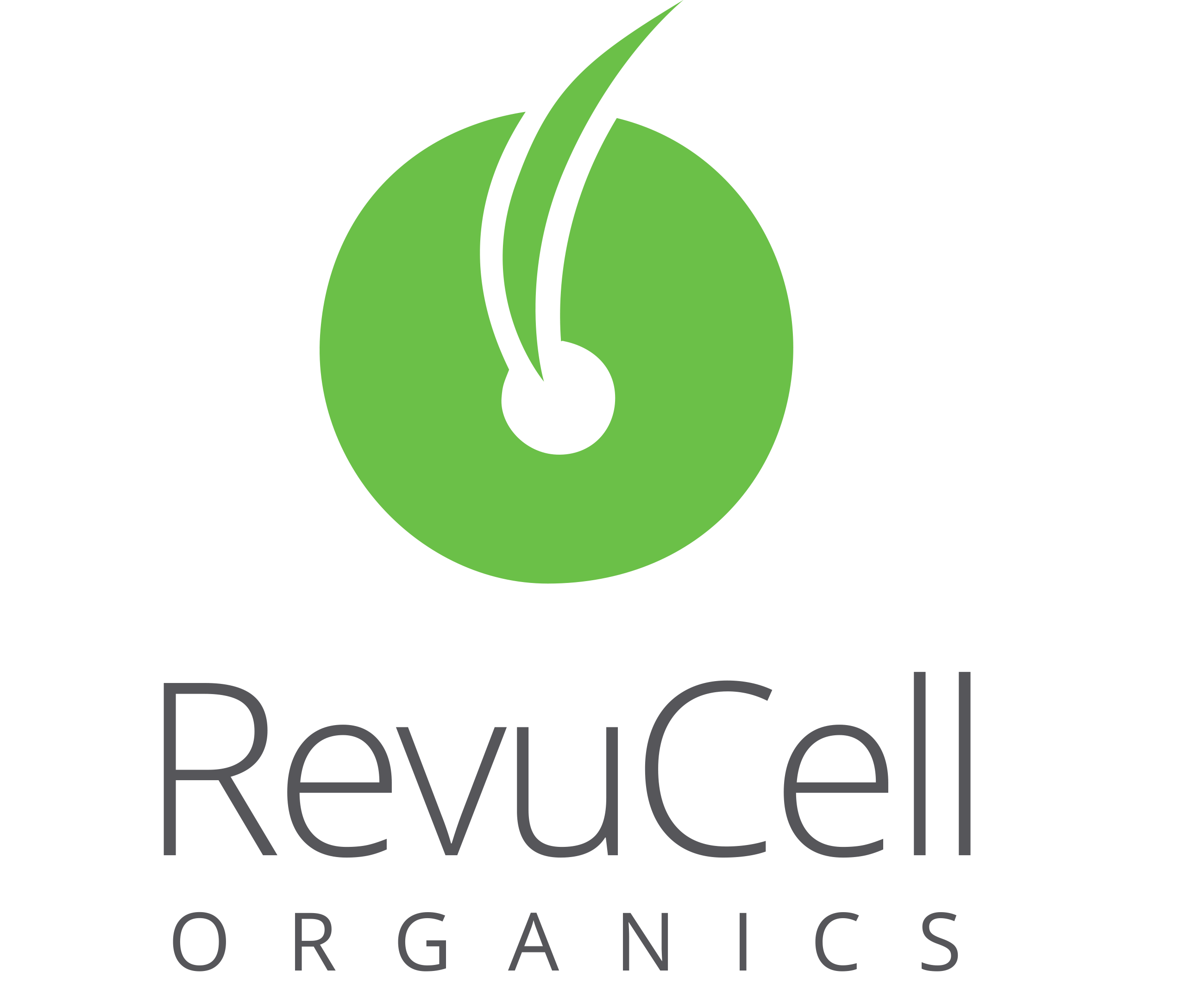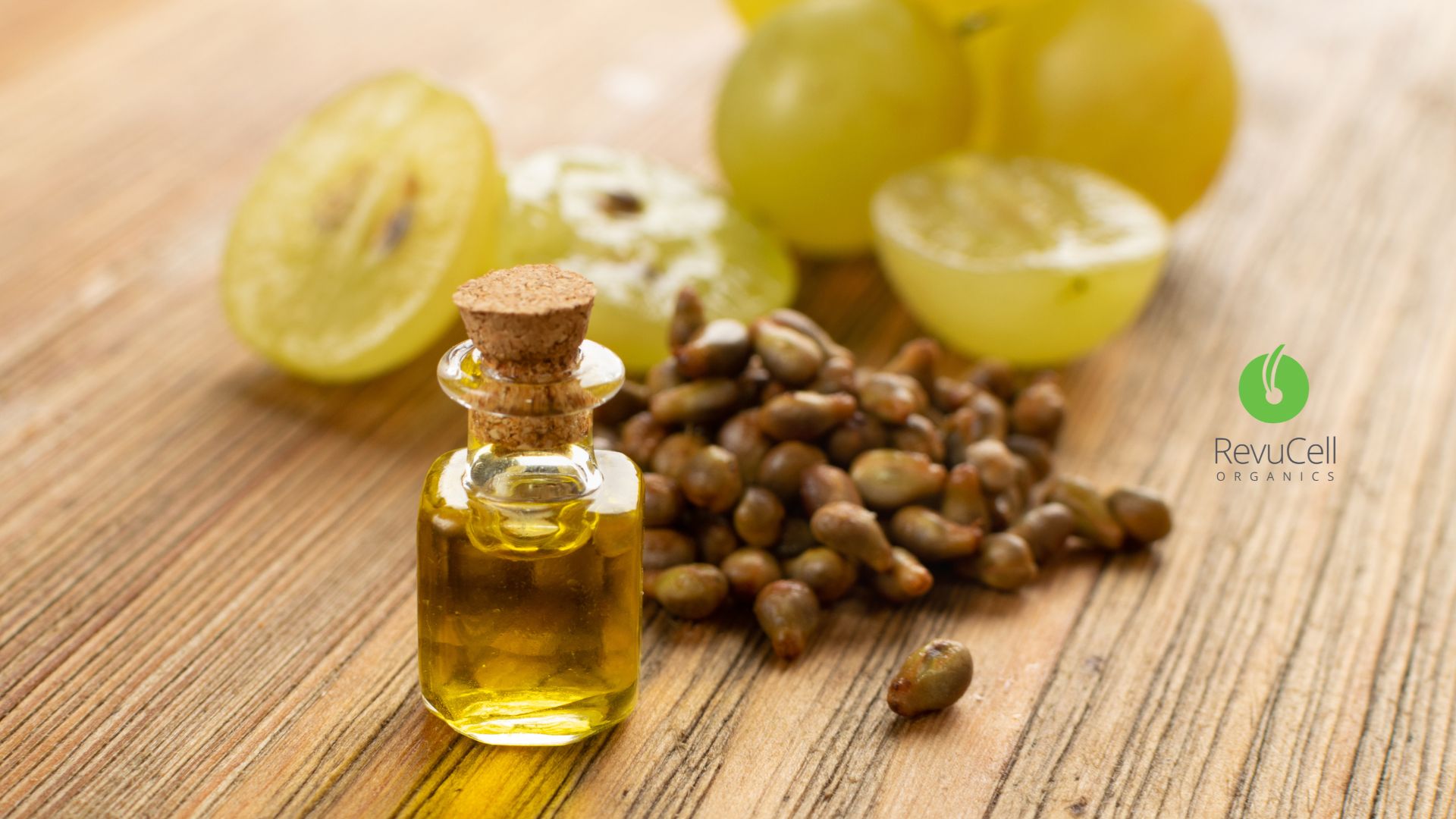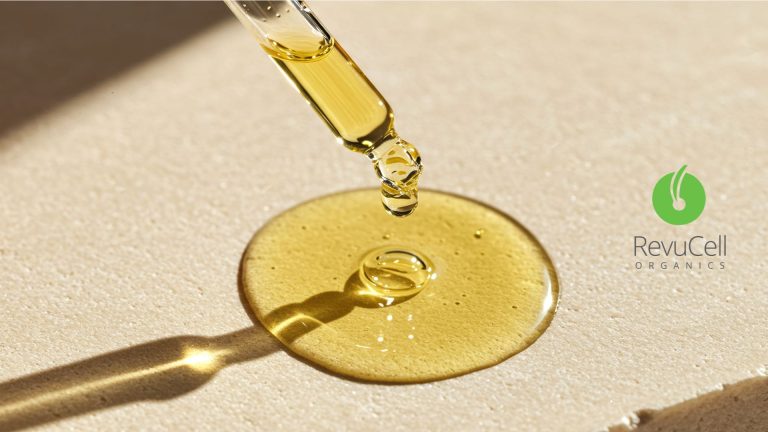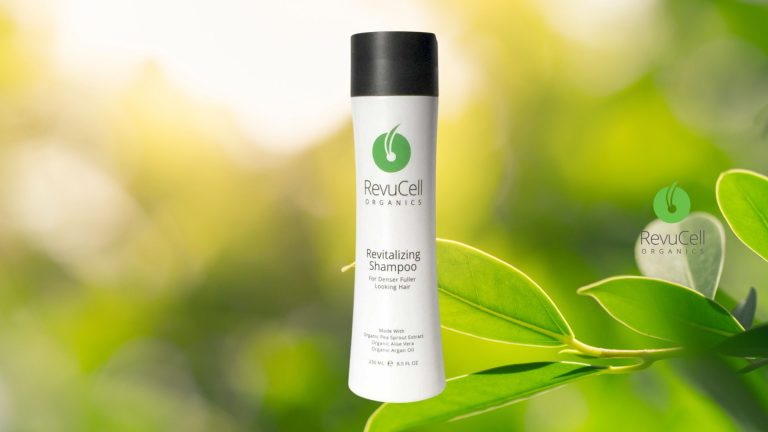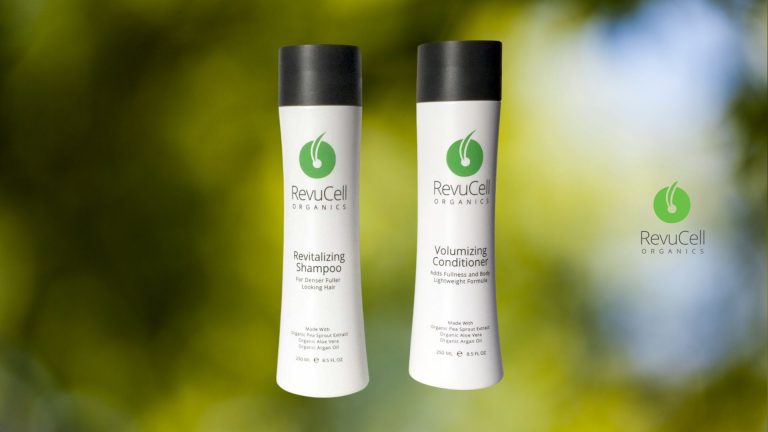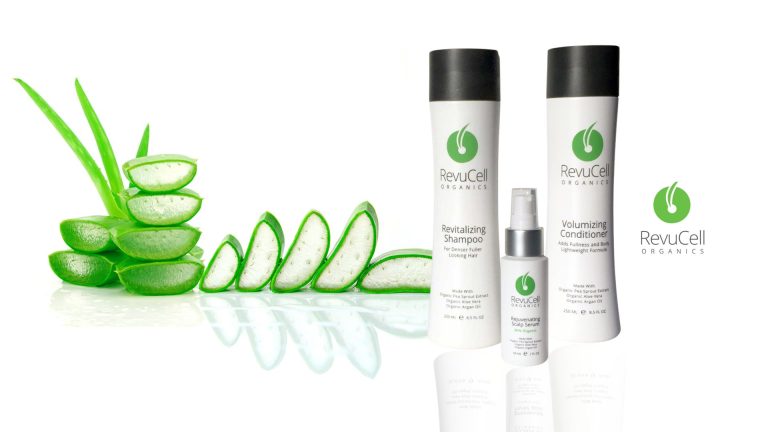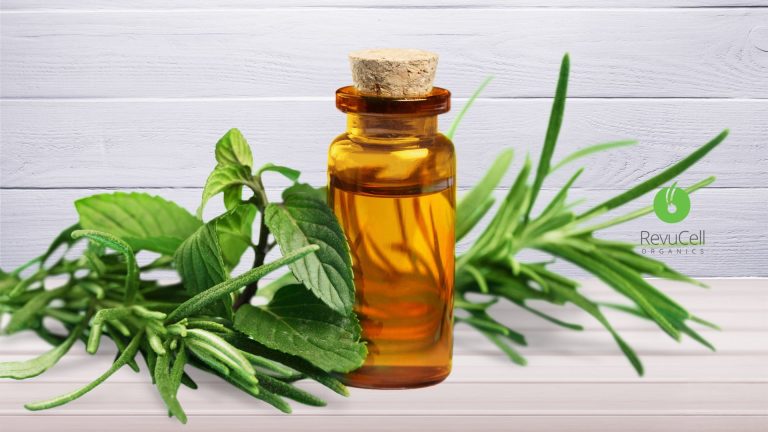Grapeseed Oil for Hair Growth: A Lightweight Botanical for Scalp Health & Follicle Support
The quest for healthier, stronger hair often leads to the world of natural botanicals, and grapeseed oil consistently emerges as a standout ingredient. At Revucell, where we approach haircare through the lens of clean science and scalp health, we believe in providing clarity about how ingredients truly function.
So, does grapeseed oil for hair growth live up to the attention? The answer lies in a critical distinction: grapeseed oil is not a direct growth stimulant, but rather a exceptional supporter of the scalp environment that follicles need to thrive. Its value comes from what it is—a lightweight, nutrient-rich antioxidant—and what it isn’t—a heavy, pore-closing oil.
This article explores the science behind grapeseed oil, its tangible benefits for hair and scalp wellness, and how to intelligently incorporate it into a modern hair care routine for sustainable results.
What is Grapeseed Oil? Beyond the Basics
Grapeseed oil is a lightweight, carrier oil extracted from the seeds of wine grapes. In the context of haircare, it’s far more than just a simple emollient. It’s a sophisticated botanical ingredient prized in advanced formulations for its unique biochemical profile.
Unlike heavier oils that can sit on the scalp and hair, grapeseed oil is characterized by its dry, non-greasy feel and rapid absorption. This makes it an ideal vehicle for delivering nutrients and active ingredients directly to the hair follicle without the risk of suffocating it or weighing down fine hair types.
The Scalp-First Approach: Why Healthy Follicles Need the Right Environment
Hair growth begins beneath the surface. Each hair follicle is a complex mini-organ that requires a specific environment to function optimally. Key to this is:
- Antioxidant Protection: Follicles are vulnerable to oxidative stress from environmental factors.
- Unclogged Follicles: A buildup of sebum, product residue, or heavy oils can impede hair emergence.
- A Balanced Moisture Barrier: A scalp that is either too dry or too oily can disrupt the natural growth cycle.
This is where the strategic use of specific oils comes into play. The goal is not to smother, but to support.
The Science of Grapeseed Oil: Linoleic Acid, Vitamin E & Antioxidants
The efficacy of grapeseed oil is rooted in its distinct composition, which includes:
- High Linoleic Acid Content (approx. 70%): This polyunsaturated omega-6 fatty acid is lightweight and anti-inflammatory. For the scalp, this means nourishment that helps maintain a clear, balanced environment around the follicle, reducing the risk of clogged pores.
- Potent Vitamin E (Tocopherols): A powerful antioxidant, Vitamin E helps protect both the scalp skin and the hair shaft from free radical damage caused by UV exposure and pollution. This protective quality helps maintain the integrity of the scalp’s barrier and the hair’s cuticle.
- Proanthocyanidins: These are potent antioxidants that further contribute to protecting hair follicles from oxidative stress, supporting overall follicular health.
Grapeseed Oil for Different Hair Types: A Lightweight Champion
Grapeseed oil’s versatility is one of its greatest strengths, particularly for hair types that are easily weighed down.
- For Fine Hair: Its low viscosity and quick absorption add moisture and shine without sacrificing volume or creating a greasy appearance.
- For Low Porosity Hair: The tight cuticles of low porosity hair resist heavy oils. Grapeseed oil’s lightweight nature allows it to provide emollient benefits and seal in moisture without sitting on the hair shaft and causing buildup.
- For Oily Scalps: By helping to maintain clear follicles and not adding heavy lipids, it can support the scalp’s natural balance without exacerbating oiliness.
How to Use Grapeseed Oil in Your Hair Wellness Routine
The “more is better” approach does not apply here. Strategic integration is key for reaping the benefits of grapeseed oil for hair growth support.
1. As a Pre-Cleanse Scalp Treatment:
- Apply a few drops directly to your dry scalp before showering.
- Gently massage for 1-2 minutes to help dissolve buildup and stimulate circulation.
- Proceed with your regular shampoo. This method ensures any excess oil is cleansed away, preventing residue.
2. As a Component of a Leave-In Treatment Serum:
- This is the most effective method for daily support. A well-formulated leave-in serum utilizes grapeseed oil as part of a synergistic blend.
- In this format, it delivers antioxidants and lightweight moisture directly to the scalp and hair, often enhanced with other actives like Tea Tree Oil for follicle clarity or AnaGain to support hair density.
3. As a Lightweight Hair Finisher:
- On damp hair, 1-2 drops emulsified in your palms and smoothed over ends can add shine and deter frizz without heaviness.
Common Mistakes to Avoid with Grapeseed Oil
- Using Too Much: A little goes a long way. Over-application can lead to a limp, greasy feel, even with a lightweight oil.
- Using it as a Substitute for Cleansing: Oils are not a replacement for a clean scalp. Consistent, gentle cleansing with a sulfate-free shampoo is non-negotiable for follicle health.
- Expecting Overnight Results: Supporting the scalp environment is a long-term commitment. Consistency with a holistic routine is what yields results.
Grapeseed Oil vs. Other Popular Oils: A Comparative View
| Oil | Key Characteristics | Best For |
|---|---|---|
| Grapeseed Oil | Lightweight, high in linoleic acid, antioxidant-rich, non-greasy | Oily/fine hair, low porosity hair, scalp treatments, antioxidant support |
| Coconut Oil | Penetrating, high in lauric acid, can be heavy/occlusive | High porosity hair, pre-wash protein treatments (for those it agrees with) |
| Argan Oil | Lightweight, nourishing, high in Vitamin E & oleic acid | Overall hydration, shine, frizz control, blendable with other oils |
| Castor Oil | Very thick, viscous, high in ricinoleic acid | Potential topical support for lash/brow health; often too heavy for scalp use |
The Formulation Advantage: Why a Blended Serum Outperforms DIY
While pure grapeseed oil has benefits, its efficacy is magnified when professionally formulated. A DIY blend lacks the stability, precision, and synergistic power of a laboratory-crafted serum.
In our Rejuvenating Hair & Scalp Serum, Organic Grapeseed Extract is not alone. It’s part of a strategic blend that includes:
- Organic Sunflower Extract for scalp-soothing nutrients.
- Vitamin E for enhanced antioxidant support.
- Sodium PCA, a natural moisture magnet, to hydrate the scalp and strands.
- AnaGain, a plant-powered active derived from pea sprouts, to support hair density.
This synergy creates a multi-functional treatment that supports the scalp environment far more effectively than a single ingredient can alone.
Pros and Cons of Grapeseed Oil for Hair
| Pros | Cons |
|---|---|
| ✅ Exceptionally lightweight and non-greasy | ❌ Not a heavy-duty moisturizer for very dry, high porosity ends |
| ✅ High in protective antioxidants | ❌ Can oxidize over time; stable formulations are key |
| ✅ Helps maintain clear, unclogged follicles | ❌ Less effective as a standalone treatment without other actives |
| ✅ Suitable for almost all hair types, especially fine hair | ❌ Results are cumulative and supportive, not instantaneous |
Frequently Asked Questions (FAQ)
Q: Can I apply grapeseed oil directly to my scalp every day?
A: While it is lightweight, we recommend using it as part of a balanced leave-in formula rather than applying the pure oil daily. This prevents any potential buildup and ensures you’re also delivering other beneficial actives. A well-formulated serum is designed for frequent, non-greasy application.
Q: Does grapeseed oil clog hair follicles?
A: Due to its high linoleic acid content and lightweight nature, grapeseed oil is considered non-comedogenic and is one of the least likely oils to clog follicles, especially when used correctly and followed by proper cleansing.
Q: How does grapeseed oil compare to argan oil for hair?
A: Both are excellent lightweight choices. Grapeseed oil is a purer sealant and antioxidant with a “drier” feel. Argan oil is more nourishing and conditioning. In our formulations, we often blend them to leverage the unique strengths of each.
Q: Will grapeseed oil make my hair grow faster?
A: It’s important to manage expectations. Grapeseed oil supports the conditions for healthy growth by providing antioxidant protection and maintaining a balanced scalp environment. This can help minimize breakage and support the hair’s natural growth cycle, but it does not directly alter the genetic speed of growth.
Conclusion: A Intelligent Choice for Scalp and Hair Wellness
Grapeseed oil’s role in supporting hair growth is indirect yet vital. By offering lightweight antioxidant protection and helping to maintain a clear, balanced scalp environment, it addresses fundamental factors that influence follicular health.
We formulate with ingredients like Organic Grapeseed Extract not because they are trendy, but because their science-backed profiles align with our philosophy: healthy hair is a reflection of a well-cared-for scalp. For those seeking a simple, non-greasy way to support their hair’s foundation, grapeseed oil, particularly within a intelligently designed routine, is a compelling choice.
